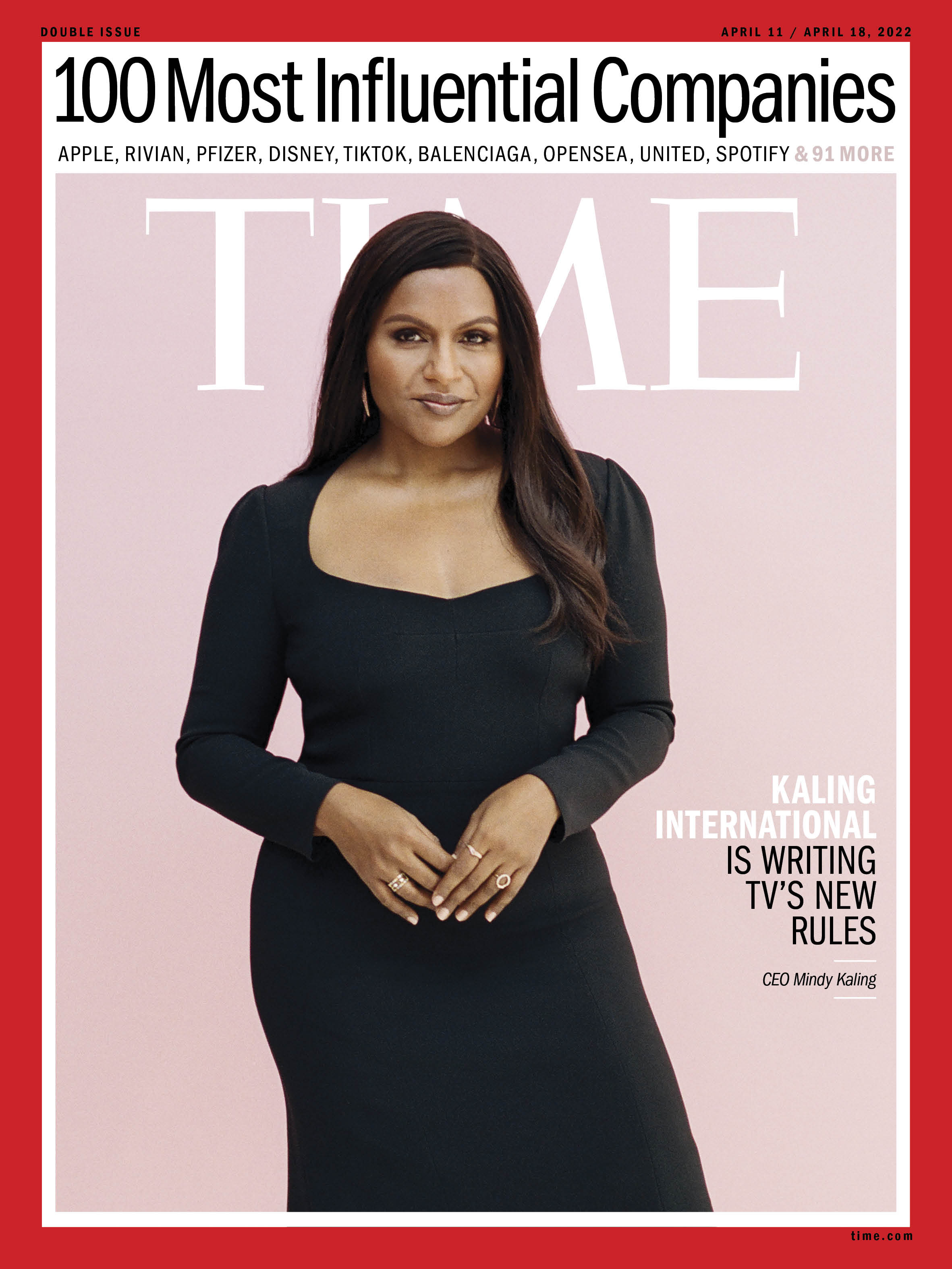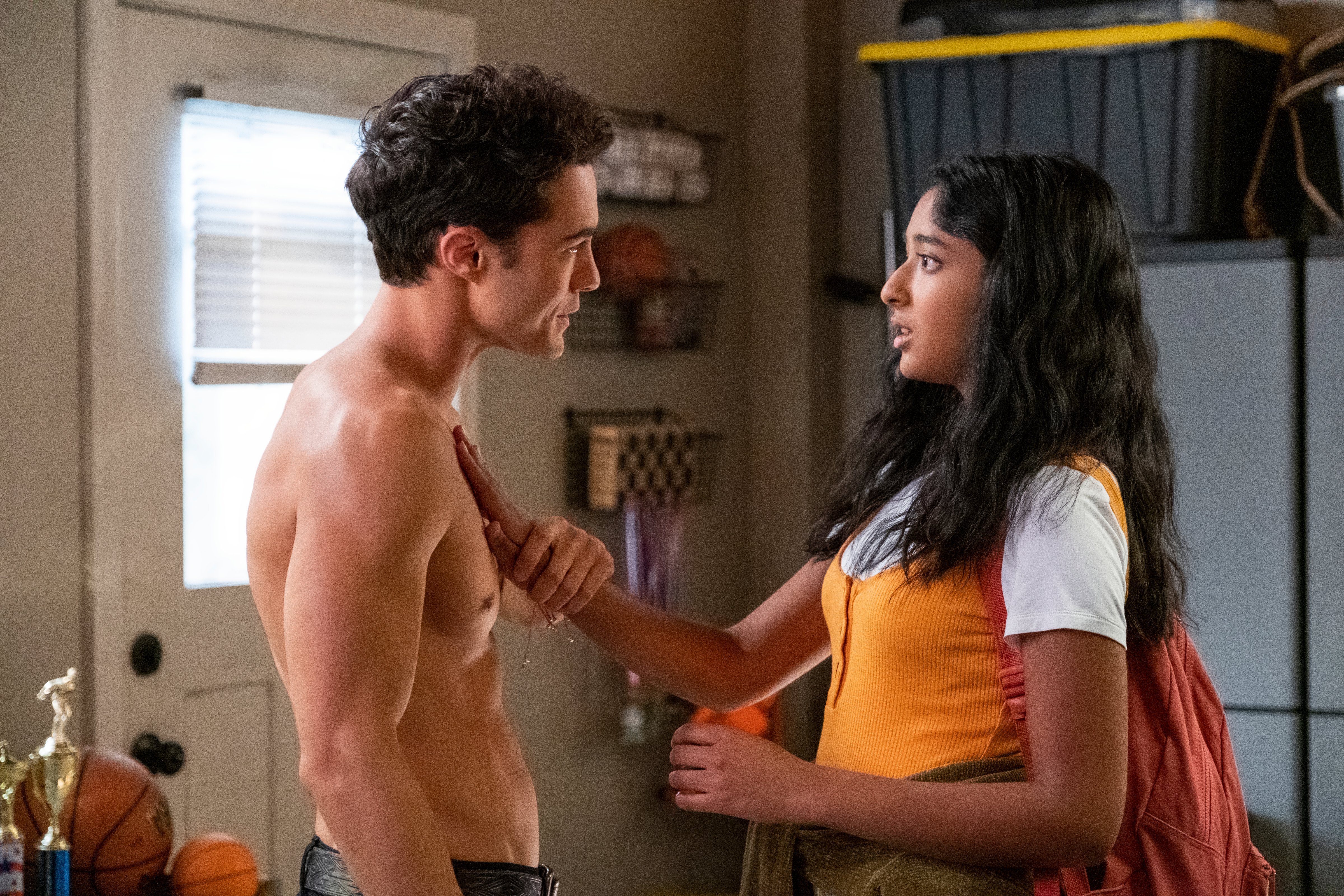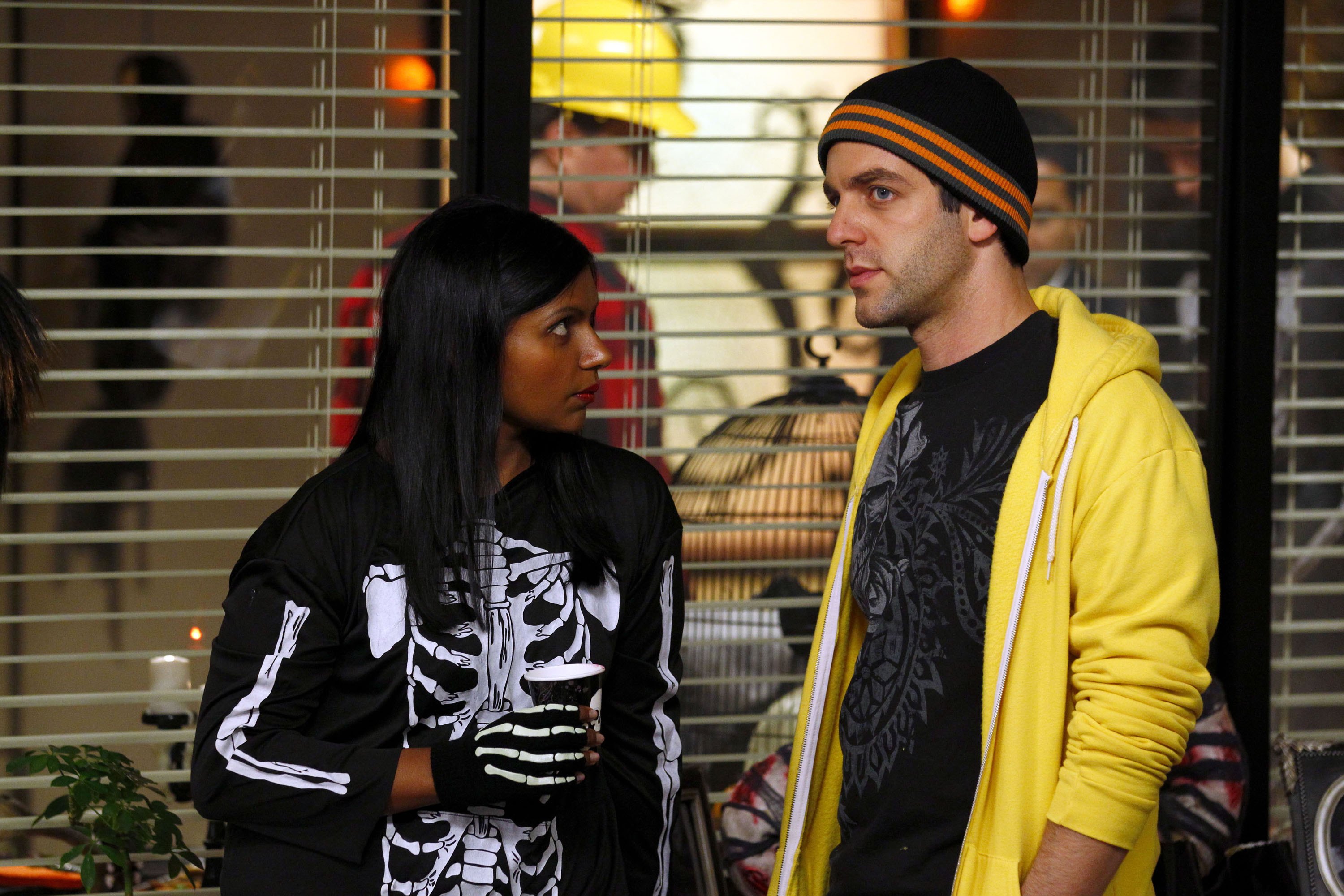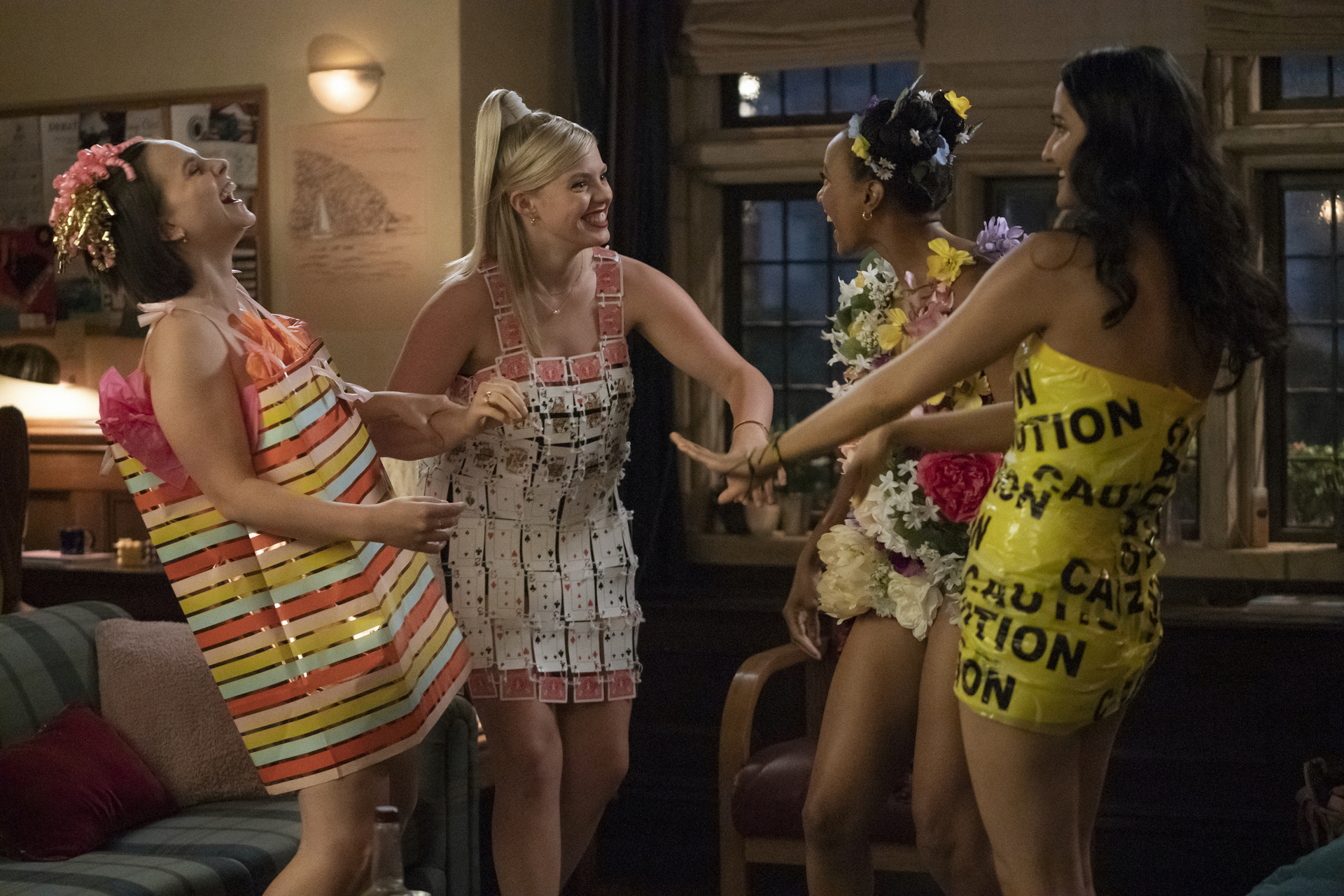Women want to be Mindy Kaling’s best friend. This is an actual problem in her life. Fans approach her in airports to solicit not just a photo but companionship. Maybe it’s her candid memoirs in which she talks about everything from being the first woman and person of color in The Office writers’ room to anxieties about what people write about her online. Maybe they see themselves in the characters she’s written for The Office, The Mindy Project, Never Have I Ever, and The Sex Lives of College Girls. Maybe they want to prove to this unabashedly ambitious person with great comic timing that they’re smart and funny too.
She’s gracious about it, but Kaling’s calendar is full. “I never leave my house,” she says. That’s not entirely true. She did on this day in March to meet me for lunch in West Hollywood and is considering doing so again for a friend’s screening in the evening—though in all likelihood she will stay in to do another pass on an upcoming book or the Legally Blonde 3 script. (Yes, it’s happening. Kaling says the film will center on Reese Witherspoon’s Elle Woods growing up: “Her cheerfulness really worked when she was 22, but what does that personality look like at 42?” she asks. “Did she end up becoming everything she wanted? Or has she become more cynical?”)
After 17 years in front of the camera, Kaling, 42, is relieved to work mostly behind the scenes. “I used to spend so much time, especially as a performer, on how to be more likable, be cool, be maternal, to seem smart and approachable,” she says. Focusing on story has allowed Kaling to “strip away ego and vanity” and do the best writing of her career: she launched her own production company, Kaling International, in 2012, with the goal of telling stories about the inner lives of women of color that have long been missing from TV.

Get a print of the 2022 TIME100 Companies cover featuring Mindy Kaling here
By her own estimation, her most recent series, the Netflix high school comedy Never Have I Ever and HBO Max romp The Sex Lives of College Girls, are her biggest critical and commercial hits to date. In 2020, 40 million households watched the first season of Never Have I Ever, which centers on an Indian-American teen who is juggling hormones and the pressures of family life alongside AP classes. And the bawdy but sweet Sex Lives of College Girls—which follows four college roommates from different geographical, economic, and ethnic backgrounds—is one of HBO Max’s most successful series to date.
Read More: Mindy Kaling Reveals Why Legally Blonde 3 Is Taking So Long
Kaling International currently employs exactly four people: Kaling, her producing partner Jessica Kumai Scott, and their two assistants. And yet somehow it is working on nearly two dozen projects—17 shows and six movies, to be precise. By contrast, the production companies Kaling cites as her inspiration, Reese Witherspoon’s Hello Sunshine and Shonda Rhimes’ Shondaland, employ dozens. And as her success and lack of social plans might suggest, Kaling has a particular knack for efficiency. “She can outline an entire season of television on the back of an envelope in the time it takes someone else to come up with one joke,” says B.J. Novak, her former Office co-writer and close friend.
Kaling picked her company’s name because it made her laugh to think that one day it could be “considered a huge corporation, like Shell Oil.” Kaling looks you in the eye when she cracks a joke. But when she’s earnest, she averts her gaze. “I’m very ambitious and would love for this company to be like [Oprah’s] Harpo. Now I’m like, ‘Oh is this funny?’” she says, looking toward the stream of actors and producers entering the restaurant. “Or is this really what I want?’”
Kaling was hired to The Office through an NBC program that incentivized showrunners to diversify their writers’ rooms by paying for the salary of one BIPOC writer. Kaling is now ambivalent about the initiative and unpacked some of those mixed feelings while writing the film Late Night, in which she plays a “diversity hire” on a talk show. But looking back on her Office days, she realizes now she was hesitant to welcome other funny, qualified women of color because that meant relinquishing the feeling that she was the only one who could fill that role. “It terrified me that they were interviewing another person of color or another woman because I’d be like, ‘Okay I’m going to get fired’ because you only needed one,” she says. “I had a lot of growing up to do in terms of not operating from a fear of getting replaced.”
She wrote more episodes than anyone else in the show’s history before she departed after the eight season to launch her eponymous sitcom, which would run for six seasons. Her career went into overdrive: She wrote several memoirs, Late Night, and produced a Four Weddings and a Funeral miniseries, all while starring in A-list ensembles like A Wrinkle in Time, Ocean’s Eight, and The Morning Show.
Founding the production company cemented her transition from rising star to queenmaker. When Kaling posted an open casting call for a South Asian teen to play the lead in Never Have I Ever, which Kaling co-created with Lang Fisher, 15,000 aspiring actors responded. She chose Maitreyi Ramakrishnan as her star, catapulting her to fame. “I transitioned from being somebody whose primary concern was keeping the show on the air to someone who was like, ‘I’m also a mentor,’” Kaling says.

“She could have stopped at being the first woman of color on The Office, and that would have been an amazing historical feat,” says Ramakrishnan, an Office superfan. “But then she said, ‘I’m going to make a whole Mindy-verse of diverse characters.’” Kaling’s shows tend to focus on young women of color, and she populates the writers rooms and crews with those women for the sake of authenticity. There’s been a push in Hollywood to diversify writers’ rooms, one that Kaling theorizes is mostly motivated by fear. “It’s pretty brazen if you have an all white staff these days, and I think the execs are savvy enough to know that’s not a good look,” she says. Yet Kaling admits to fretting over producing too many shows about Asian women in particular.
“I’m a dark skinned Indian woman, and I always had friend groups that were diverse, and I had just never seen that done on TV,” she says. “You think, ‘Oh man, that feels really niche. What I found is that my two biggest hits were these two shows about cliques of young, diverse women. People find universality in those situations. I will never underestimate audiences again.”
A lot of people make the mistake of describing Mindy Kaling as unapologetically feminine. It’s easy to conflate her with the lovelorn characters she plays or be distracted by the fact that she has an affinity for bright colors in a world full of drab power suits. “I think because I love fashion and makeup, and I have a high voice, there’s a sense that my personality is really girlie. But anyone who knows me would describe me as very masculine,” she says. “I’m decisive and impatient, and a lot of these qualities that make a leader that are unfortunately ascribed to men.”
Kaling International is actively developing projects about subjects other than teen girls in part to prove its range, including a comedy about a female basketball executive inspired by the Los Angeles Lakers’ front office, an adaptation of the Jennifer Weiner bestseller Good in Bed, a series for FX about Kari Ferrell—the late-2000s blog fixture known as the “hipster grifter”—and a show starring Mindy Project actor Xosha Roquemore loosely based on Roquemore’s life as a working mom in Hollywood. The company isn’t totally abandoning the teen girl: Kaling is producing and starring in Velma, an animated Scooby Doo spinoff. Nor has she forsaken the rom-com: She is teaming with Priyanka Chopra Jonas for a movie set at an Indian wedding.
If Kaling can pinpoint a theme that unites her projects, it would be underdog stories, and she chafes at the implication that concentrating on women’s emotional drama is somehow indulgent. “Women are conditioned to think about female content as tinged with shame, whereas a guy will just be like, ‘I freaking love Middle Earth,’” she says. “By the way, I love Lord of the Rings, but that’s never categorized as a guilty pleasure. My shows are, even by the women who are fans of them.”

However you categorize Kaling’s shows and films, a lot of them are about to flood our streaming services. This abundance is a testament to her work ethic, which has roots in a previous generation. Kaling’s parents worked long hours. A doctor and an architect who were both raised in India but met in Africa, they immigrated to the United States in 1979, the same year Kaling was born in Cambridge, Mass. Her mother had to repeat her entire residency as an OBGYN after arriving in the U.S. but never complained. Kaling would be the first to admit that she loves complaining, but, like her parents, she loves work.
Today, for example, Kaling woke up at 5:15 a.m. after she heard her four-year-old daughter stirring. Instead of going back to sleep, she pulled her laptop into bed, and began to edit pitches and scripts through the pre-dawn hours. She offered notes on a third season episode of Never Have I Ever, prepped a presentation she’ll give later that day to Warner Bros. on an adaptation of the novel Gold Diggers, thought up possible jokes for her shows while running on the treadmill, and on the way to school tried to extract precious details about her daughter’s inner life. (“In the car, her defenses are down and she’ll tell me about her life, so that 20 minutes are valuable.”)
This all happened before lunch at The Tower Bar, a poolside restaurant in West Hollywood so full of celebrities that photos are forbidden. She jokes that I unwittingly snagged the “Leo table” (as in DiCaprio) reserved for the biggest celebs—“The closer to the pool you are, the bigger deal you are”—and suggests we order mimosas that we barely touch because, again, leaving the house is a big deal. The only hint that she is missing any sleep comes when she forgets the silly pseudonym under which she made the restaurant reservation. “She always tells me, ‘I’ve got to take time off. I’ve got to retire,’” says Novak. “Then she takes a one-hour nap and has 10 new show ideas.”
Netflix brought the idea of Never Have I Ever to Kaling after an executive read Kaling’s books and zeroed in on her stories from childhood as potential fodder. But Kaling came up with The Sex Lives of College Girls after reading an article about Malia Obama allegedly getting caught smoking on video while she was a student at Harvard. “I thought of this character who is, in many ways, really privileged. But she’s also unfortunate in that she just wants to experiment, and she’s being followed and photographed,” she says. Kaling, who is nostalgic for her time as an undergraduate at Dartmouth, wanted to build a show around that character and three other suitemates who illustrate the clashes of money, class, race, and sexuality that many people encounter for the first time in college.
Kaling and her co-creator Justin Noble accomplish the near-impossible feat of fulfilling the title’s promised raunchiness while approaching the tricky subject of college sex in the #MeToo era. Kaling uses an intimacy coordinator to facilitate authenticity and comfort for her young performers. That’s no easy feat for storylines like one in which a character offers handjobs to six classmates in the hopes that doing so will earn her a coveted spot on the campus’ humor magazine. The scene is shot in a madcap style but does not diminish the importance of the character’s choice. The character isn’t shamed for her actions—instead, her suitemates debate whether the move is empowering or compromising. They’re all a little bit right and a little bit wrong.

Kaling believes writing about BIPOC women gives her another advantage over other TV shows. Despite The Office’s enduring popularity—it was the most streamed show in 2020—Kaling doesn’t think anyone would greenlight the series today. She believes it’s obvious to most viewers that the awkward, inappropriate, sometimes racist, sexist, and homophobic boss Michael Scott is not an aspirational figure. “Audiences know we’re supposed to laugh at him and not behave that way, but studios get a little squeamish,” she says. “One of the great things about writing comedies with the characters that I have, who are largely women of color, is that the characters are not oppressors. They’re largely people who have been oppressed. So they can say much more.”
Kaling admits she should probably be more worried about crossing a line with her jokes in a moment when many comedians are wringing their hands over those strictures. But she approaches script writing with the same brazen confidence as everything else she does. At the end of our interview, Kaling thanks me for not asking her whether she experiences imposter syndrome, a question she apparently gets a lot. “I don’t see anyone asking Mike Schur or Aaron Sorkin if they have imposter syndrome,” she says, of her male writing counterparts. “I worked at The Office for eight years doing 24 episodes a year. If I had imposter syndrome after that training, I’d be pathologically under-confident.”
Styled by Hayley Atkin, wearing Dolce and Gabbana; Hair by Patricia Morales; Make-up by Janice Kinjo; Nails by Thuy Nguyen
- Cybersecurity Experts Are Sounding the Alarm on DOGE
- Meet the 2025 Women of the Year
- The Harsh Truth About Disability Inclusion
- Why Do More Young Adults Have Cancer?
- Colman Domingo Leads With Radical Love
- How to Get Better at Doing Things Alone
- Michelle Zauner Stares Down the Darkness

